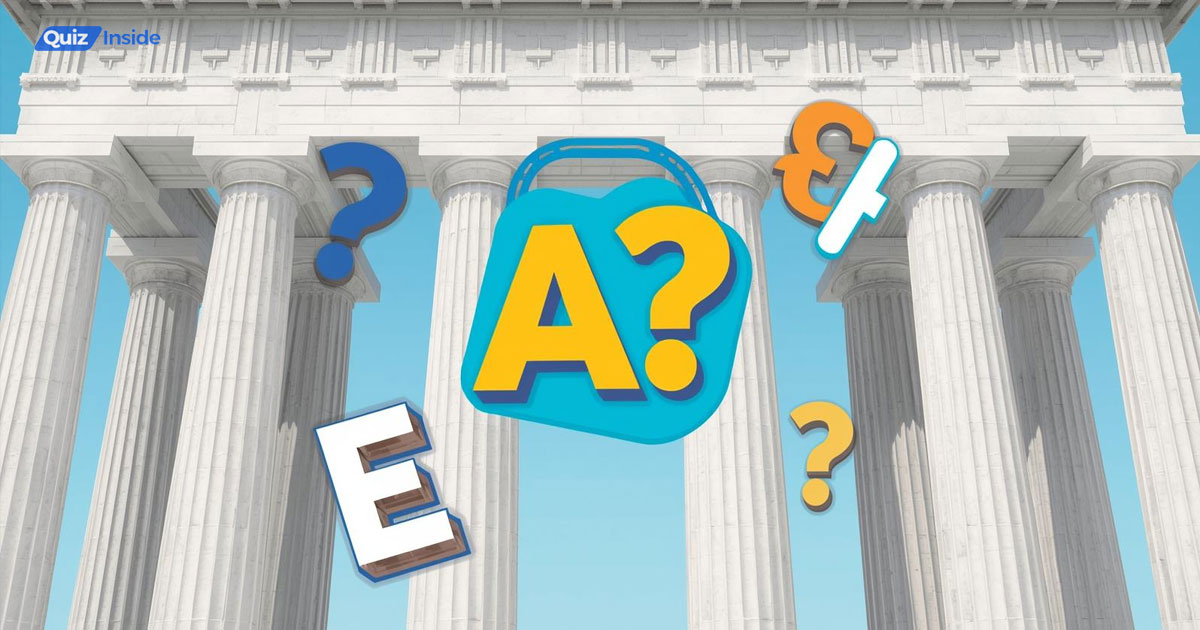A Greek alphabet quiz tests your knowledge of the 24 letters of the Greek alphabet, their names, symbols, and often, their modern applications in science and mathematics.
Test your knowledge of letters and history with The Greek Alphabet Quiz—a fun way to learn, remember, and master the ancient Greek alphabet.
Results
Congratulations, You Passed! 🎉
Amazing work! You’ve mastered the Greek letters and shown your sharp mind. Keep exploring more quizzes to challenge yourself and learn even more. Ready for the next brain-teasing challenge? 🚀✨
Oops! You Didn’t Pass This Time 😅
No worries—every mistake is a step toward learning! Review the letters, try again, and soon you’ll ace the Greek Alphabet Quiz. Keep going and challenge yourself! 💡✨
#1. What is the first letter of the Greek alphabet?
#2. Which Greek letter is commonly used to represent angles in mathematics?
#3. What is the Greek letter for “B”?
#4. Which Greek letter is used to represent the last in a series or the end of something?
#5. What is the Greek letter for “G”?
#6. Which Greek letter is commonly used to denote a summation in mathematics?
#7. What is the Greek letter for “D”?
#8. Which Greek letter is often used to represent the golden ratio?
#9. What is the Greek letter for “E”?
#10. Which Greek letter is commonly used to represent the mathematical constant 3.1415…?
#11. What is the Greek letter for “L”?
#12. Which Greek letter is used in physics to represent wavelength?
#13. What is the Greek letter for “M”?
#14. Which Greek letter is used in science to represent angular velocity?
#15. What is the Greek letter for “N”?

The Greek alphabet is a fascinating piece of human history, a system of writing that has shaped Western civilization in profound ways. It’s more than just a collection of letters; it’s a foundational element of mathematics, science, and even the names of fraternities and sororities. For many, the first encounter with a Greek letter outside of a history class is in a high school physics or calculus lesson. Suddenly, symbols like alpha (), beta (), and gamma () are no longer just foreign characters but essential tools for understanding complex concepts. An “Greek alphabet quiz” is a fun and educational way to test your familiarity with this ancient script. It’s a chance to see how much of this foundational knowledge has stuck with you, whether from a forgotten science class or a curious moment of learning.
This article explores the enduring legacy of the Greek alphabet, the fun of testing your knowledge with a quiz, and the surprising places you might find these letters in your daily life.
The Enduring Legacy of the Greek Alphabet
The Greek alphabet is the ancestor of nearly all modern European alphabets, including the Latin alphabet used for English. Its creation around the 9th century BCE marked a significant leap forward in human communication. Unlike earlier writing systems that were based on syllables or ideograms, the Greek alphabet was the first to have a distinct symbol for each vowel and consonant, making it remarkably efficient and adaptable.
From Ancient Texts to Modern Science
The influence of the Greek alphabet is undeniable. Philosophers like Plato and Aristotle used it to write their groundbreaking works, which formed the basis of Western philosophy. Mathematicians like Pythagoras and Euclid employed these letters to develop theorems that are still taught today. In the world of science, these letters became the universal shorthand for constants, variables, and concepts. The Greek letter pi () has become a symbol of mathematics itself, representing the ratio of a circle’s circumference to its diameter. Similarly, sigma () is used to denote summation, and delta () represents a change or difference in a variable.
The use of Greek letters in science creates a universal language that transcends spoken languages. A physicist in Japan and a physicist in Germany can communicate complex formulas using the same Greek letters, ensuring clarity and consistency. This makes a Greek alphabet quiz particularly relevant for anyone in a STEM field.
A Cultural and Social Staple
Beyond the academic world, Greek letters have a strong presence in social and cultural contexts, particularly in North America. The Greek letter system is used to name fraternities and sororities at universities and colleges across the continent. Names like Sigma Chi or Kappa Kappa Gamma instantly bring to mind images of campus life and brotherhood or sisterhood. The letters are chosen for their sound, meaning, and historical significance, creating a unique identity for each organization.
Furthermore, Greek letters are often used in sports to denote rankings or in military and scientific missions. For instance, the first and last letters of the alphabet, Alpha and Omega (), have long symbolized the beginning and end of something, a concept that dates back to ancient times and is still widely understood today.
Taking the Greek Alphabet Quiz: A Fun Challenge
A Greek alphabet quiz is a fantastic mental exercise. It’s a test of memory, quick recall, and pattern recognition. The questions can be simple or incredibly detailed, depending on the quiz’s difficulty.
Types of Quiz Questions
A well-rounded quiz should include a variety of question types to keep things interesting.
-
- Letter Recognition: This is the most basic and common type of question. The quiz shows you a Greek letter, and you have to identify its name.
- Name-to-Letter Match: The reverse of the first type. You are given the name, like “epsilon,” and you must choose the correct symbol ().
- Modern Application: These questions add a layer of difficulty and context. They might ask, “Which Greek letter is used to represent wavelength in physics?” (The answer is lambda, ).
- Historical Context: More advanced quizzes might ask about the order of the letters or their etymological roots.
Here’s a simple table to illustrate the different types of questions:
Improving Your Knowledge: Tips for Acing the Quiz
If you find yourself struggling with a Greek alphabet quiz, don’t worry! With a little practice, you can master all 24 letters.
Mnemonics and Memory Aids
One of the best ways to learn the alphabet is through mnemonics and rhyming schemes. Many people learn the alphabet by singing a song or using a simple phrase. You can create your own or find one online. For example, “Alpha, Beta, Gamma, Delta…” can be memorized as part of a rhythmic chant. Creating a mental picture for each letter can also help. For instance, visualize the Greek letter Omega () as a pair of headphones.
Consistent Practice
Like learning any new skill, consistency is key. Spend a few minutes each day reviewing the letters. There are numerous free online resources and flashcard apps specifically designed for learning the Greek alphabet. You can find them by searching “Greek alphabet flashcards” or “learn the Greek alphabet online.”
The Power of Context
Try to associate each letter with its modern application. When you see rho (), think of density in physics. When you see phi (), think of the golden ratio. This contextual learning can make the letters feel less abstract and more meaningful, cementing them in your memory.
Conclusion/Final Words
The Greek alphabet is an incredible testament to the power of human ingenuity. It has served as the backbone for countless scientific discoveries, philosophical debates, and cultural traditions. A Greek alphabet quiz is more than a simple test; it’s a celebration of this enduring legacy. Whether you’re a student looking to brush up on your knowledge, a trivia enthusiast seeking a new challenge, or just a curious mind, diving into the world of Greek letters is a rewarding experience. It’s a journey back in time and a look at the very foundation of how we communicate and understand the world.
Frequently Asked Questions (FAQ)
Q1: How many letters are in the Greek alphabet? A: There are 24 letters in the standard Greek alphabet, from Alpha to Omega.
Q2: Are the Greek letters used in math and science the same as in the ancient texts? A: Yes, the symbols are the same, though their specific usage and pronunciation may have evolved over time. The names and symbols have remained consistent for centuries.
Q3: Is the Greek alphabet used in modern Greece? A: Yes, modern Greek is still written using the same alphabet, although some letters have slightly different pronunciations than in ancient times.
Q4: Which Greek letter is a symbol for the golden ratio? A: The Greek letter Phi () is famously used to represent the golden ratio, a special number approximately equal to 1.618.
Q5: What is the significance of the first and last letters, Alpha and Omega? A: Alpha () and Omega () symbolize the beginning and the end. This concept is used in many contexts, including philosophy, theology, and general phrases to mean the entire spectrum of something.
Q6: Can I find a Greek alphabet quiz for free online? A: Yes, there are many websites and apps that offer free quizzes and flashcards to help you learn and test your knowledge of the Greek alphabet. A quick search will yield a variety of resources.
Q7: Why is it called “Greek alphabet” if other cultures used similar letters? A: The Greek alphabet is considered the first true alphabet in the Western world because it was the first to assign a distinct symbol to both consonants and vowels, a system that was then adapted by other cultures, including the Romans to create the Latin alphabet.







